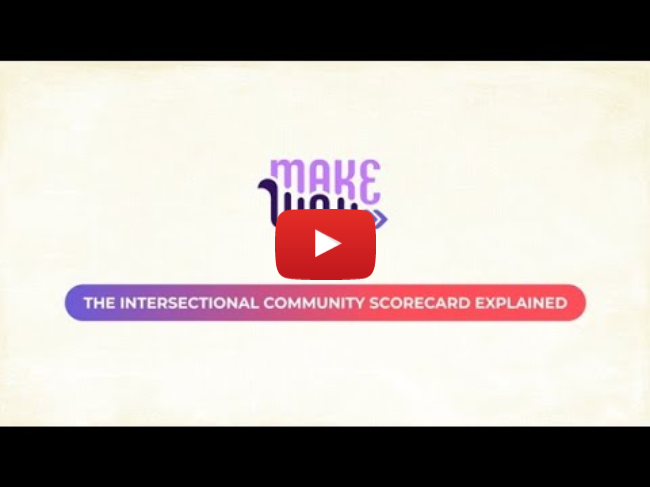
|
New video: explaining the Intersectional Community Scorecard
The Make Way programme has released a video explaining the use of the Intersectional Community Scorecard. This tool empowers marginalized youth to advocate for their sexual and reproductive health (SRH) by bridging the critical gap between their unique needs and existing health services. It works by connecting youth to health service providers and assess, score and improve the availability, accessibility, acceptability and quality of local SRH services - ensuring no one is left behind. Check out the video ➔
|
|
|
|
SRHR for all: Representing marginalized youth at the NGO CSW
Make Way recently attended the NGO Committee on the Status of Women (NGO CSW) focused on gender equality with Make Way Uganda youth representative, Nakigudde Hannah Margaret. We sat down with Hannah to learn more about her experiences and key takeaways at the forum, as well as the salience of marginalized youth being given a seat at the table at international conferences. Read Hannah's insights
➔
|
|
|
|
 |
Fruitful roundtable on regional production of medical products
How can we collectively ensure sustainable and effective regional production of health products in Africa, thereby increasing the continent’s self-reliance? To build a shared understanding of this matter, Wemos organized a roundtable discussion with key stakeholders, in collaboration with the European Centre for Development Policy Management (ECDPM). We convened the roundtable in preparation for the World Local Production Forum from 7 to 9 April, where we will join a panel discussion on the topic. Read more in our LinkedIn post ➔
|
|
|
|
 |
Opinion: Your budget cuts are about us, the people
Amid all the news reports about the draconian end to USAID, many have spoken out against the injustice to people around the world. Yet you seldom hear from the youth who are directly impacted by these decisions. Global North governments must realize that there are real people behind their decisions and apply a people-first approach. Read Make Way’s latest opinion piece calling for human-centred policies by youth representatives Bertha Chulu, Elizabeth Warindi and Vilda Atieno. Read more ➔
|
|
|
|
Make Way for Youth podcast: Kenyan Reproductive Health Policy
This episode dives into the Kenyan Reproductive Health Policy with special guest, Lilian Muchoki, a renowned sexual and reproductive health and rights (SRHR) advocate partnering with the Trust for Indigenous Culture and Health (TICAH). Participants discuss the contentious issues surrounding the policy such as limited public participation during its inception and other barriers that prevent young people accessing SRHR. Listen on Spotify, YouTube and Apple Podcasts.
|
|
|
|
 |
Meet our partner: Diverse Empowerment Foundation
We’re proud to spotlight one of our partners in the Make Way programme: Diverse Empowerment Foundation. They are a grassroots organization that advocates for the rights, inclusion, and empowerment of LGBTQ+ individuals and persons with disabilities. We sat down with Gracie Brendah, SRHR Advocacy Officer at Diverse Empowerment Foundation, to learn more about their important work, collaboration with Wemos and joint impact. Read more ➔
|
|
|
|
Join us at the State of Tax Justice conference
Join us on 14 April, in Amsterdam, for the 'State of Tax Justice' conference, hosted by SOMO. Together with experts from academia and civil society, we will discuss the progress and challenges in the fight against tax avoidance. The event also marks the farewell of Arnold Merkies, a key voice in the Dutch Tax Justice movement.
📍On 14 April, from 14:00, at Pakhuis de Zwijger. Read more and register (free) ➔
|
|
|
|
Wemos tips and picks
'Crip Camp' tells the story of Camp Jened, a camp for people with disabilities where a global rights movement sparked in the 1970s. With archival footage and interviews, it shows their fight for a better, more inclusive life. From there emerged advocates like Judy Heumann, who contributed to disability policies at the United Nations and World Bank. With 1.3 billion people with disabilities, this movement transformed essential services like health and education. On Netflix and YouTube.
|
|
|
|
© Wemos - 2025 - Sent to _t.e.s.t_@example.com - Unsubscribe Wemos, Plantage Middenlaan 14, 1018 DD Amsterdam, The Netherlands
|
|
|
|
|